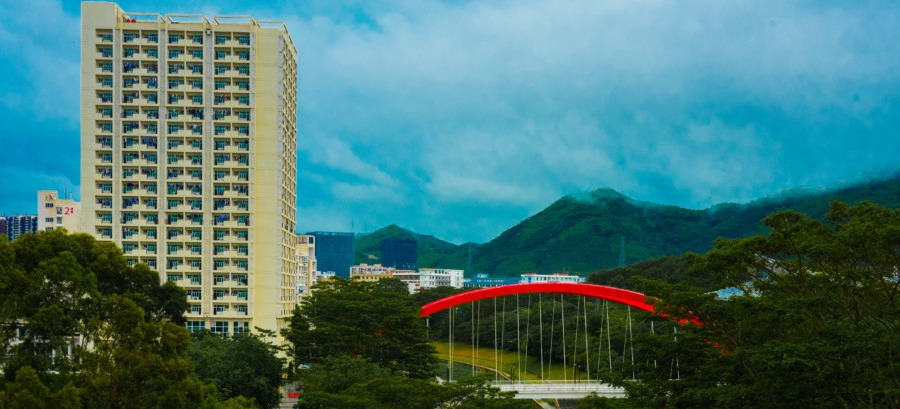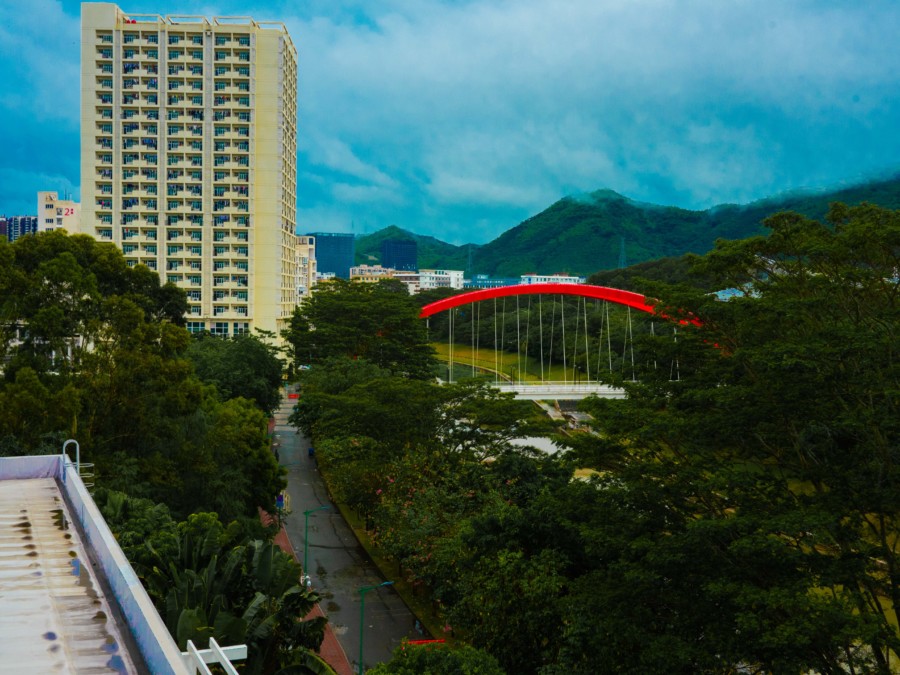From the rooftop deck of where I work, you can just about see where I live; my dorm is in the next tower directly behind the building on the left.
The feasibility of run commuting depends not only an ability to run but also the length of the commute. No matter how dedicated a runner you might be, you have to consider the feasibility of the commute distance. My decision to be a run commuter is about my desire to run as much as it is about my lack of desire to be much of a commuter. You have to travel to appreciate your home. My summer in Shenzhen, China, made me realize how much each of us can control an aspect of our lives that we should not mistake as circumstance: whether we live close to work or not. I want to stay within the limits of my ability to carry myself on my own two feet to my desk each morning. (I am doing 4.5 miles on average, in San Francisco. I might be willing to take that up to 5. I doubt I have the skill to push past that number.)
My preference has always been to have a house near the office. I am sympathetic to those who have made another choice, considering family or other factors, and far be it for me to pass judgment. But I wonder if each of us makes ourselves miserable by increasing the miles we have to journey to a job on a regular basis, while also adding to the burden on the environment with a carbon footprint more substantial than needed.
When my wife and I married, she moved into half a duplex I owned in Washington, D.C. The unit was behind a fast-food restaurant, which I took to be a convenience during my days as a bachelor, but to which she, especially as a vegetarian, objected to as a nuisance — you could just about place a drive-through order from the bedroom window. I was a law professor a few blocks away. That was not an accident, because I had sought out real estate that would be walkable to campus. In those days before I embraced the run commute regimen, however, I exhibited a moral failing that now I regret, I complained to my wife about the ten minute stroll, and I even drove sometimes (confession: often), my excuse being the heavy casebooks I had to carry. She pointed out I could become a clerk at the deli around the corner if I really wished for convenience,
Later, I had an opportunity to move back to my hometown of Detroit. I became a law school dean. My wife wished to remain in the capitol even as I returned to the Motor City. We bought an architectural landmark downtown, which was feasible in that magnificent wreck of a metropolis, symbolic of all that happened in twentieth century America, especially the development of car culture. As absurd as it might have seemed to fly back and forth, I did a few calculations, In a typical week, I commuted only as much as the average suburbanite who toiled downtown in terms of the time in transit.
This summer, I am humbled to be a visiting professor at Peking University School of Transnational Law. The institution, which uses Chinese and English as the language of instruction (I am capable only in the latter to my chagrin), is in Shenzhen, a city that sprang up as a special economic zone across the border from the then British colony of Hong Kong. I was presented the option of a dorm room in the tower for foreign experts or a long term stay at a hotel just off campus. Consistent with my philosophy, I went for the former. By my calculation, I am three minutes from the newly opened law school building at a crawl or probably ninety seconds in a sprint. (The old building was even closer, across a reflecting pool.) It being typhoon season, last Thursday I was at the exact midpoint, having waited for a clear moment, when the skies opened again. No benefit to you turning back, I trudged forward, arriving drenched.
Other than that, my stint here has been without mishap. Since I am overseas, and only temporarily, I feel as if my horizons have expanded, not constricted. It is true I live so close to work I can come back “home” for lunch. That is an advantage. I love being embedded within the community. I am dedicated to my teaching. There isn’t a moment wasted in traffic. I always can wander farther for entertainment. One night we journeyed to an Italian restaurant in an upscale mall. My sense of scale adjusts. Thanks to the ability to hail a car when needed, I am not constrained.
I like the countryside and rural areas with open space — for a weekend excursion. I would rather not be stuck in a subdivision where I would depend on an automobile even to shop for groceries. There are material benefits to population density. There are costs too of course. Yet on the whole, to run commute is to engage directly with the people around you, on the ground. It is to value human interaction, sustained relationships, and civic engagement.


